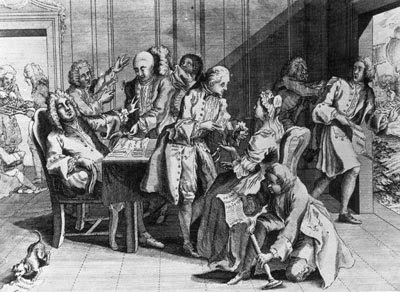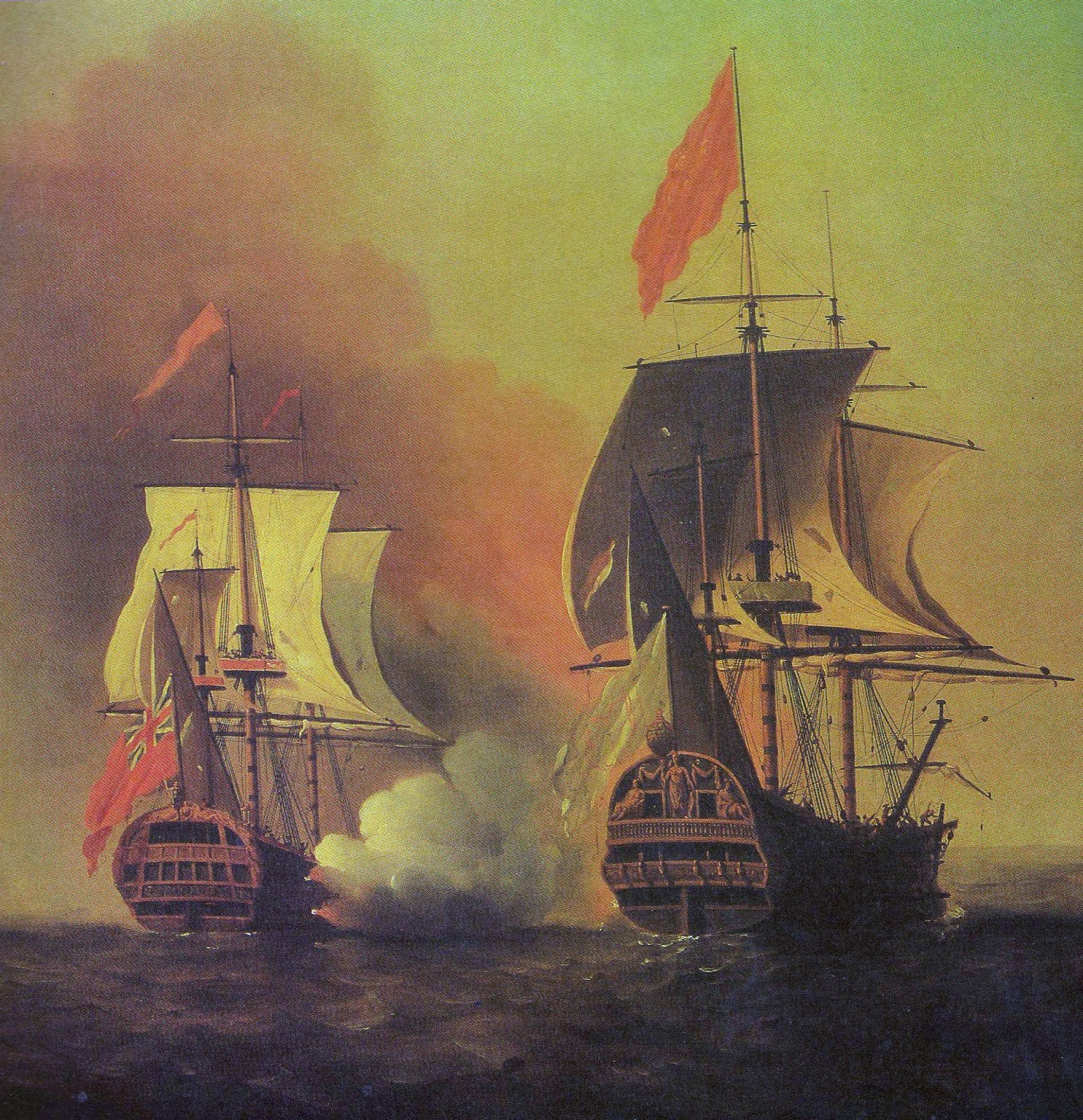 |
| Fig.1: I miss the days when people loved their lobes so much, they were willing to fight for them. |
A wise man once said, "War, what is it good for? Absolutely nothing.
(Say it again, y'all!)" Indeed, many people have fought and died over petty reasons, such as land, money, resources, and some chick named Helen. But possibly the silliest thing that war was ever declared over was a severed ear. Think I'm making this up? Well don't tell that to British captain Robert Jenkins, whose ear was sliced right off in 1731 by a Spanish commander who claimed that he was smuggling goods out of the West Indies. While this was not the sole cause of the war, it essentially because the straw that broke the camel's back (or the sword that broke the captain's ear), and open hostilities commenced between Great Britain and Spain. In a sense, this was one of the first "world wars" in history, as fighting took place within their colonial possessions across five continents, with Africa being the only inhabited one to escape the bloodshed (they got lucky, for once). Who knew that an ear drum would lead to the beating of the war drum?
 |
Fig.2: The handbook to the asiento
was featured on the New York Times'
Worst Sellers List. |
Great Britain and Spain had been having an on-again off-again war-relationship (warlationship?) for nearly two centuries, really ever since Queen Elizabeth of the former spurned the advances of King Philip of the latter, forcing him to send his
Armada after her. In an attempt to smooth things over, the two nations agreed to something called an
asiento (fig.2) in 1713: Britain gained the rights to sell slaves to the Spanish colonies, as long as the British didn't take any of the colonies' prized goods (precious metals, textiles, potatoes) in return. Back in the day, the policy of mercantilism made it so colonies were only allowed to trade with the mother-country as a way to
be jerks promote economic stability, so the British should have been happy enough that they were allowed to sell anything to the Spanish. Instead, many British merchants bought those goods anyway and smuggled them back to Europe, where they could undercut Spain's selling price on those delicious chips that go with the fish.
Things came to a head in 1731 as British Captain Robert Jenkins and the HMS
Rebecca set sail after visiting the Spanish colony of Florida. It was soon flagged down by the Spanish patrol boat
La Isabela and its captain, Julio León Fandiño, who flashed his high beams at them. As was normal, the Spanish searched the ship for smuggled goods, and reportedly found a cache of items hidden away. As was not normal, Fandiño tied Jenkins to the mast of his own ship and began to interrogate him. When Jenkins denied knowledge of the goods, the Spanish captain sliced his left ear off and said something to the extent of, "Go and tell your king that I will do the same to him, if he dares to do the same!" The captain had an ear-y suspicion that His Highness would become quite ear-itable if given such a inconsid-ear-ate message.
 |
Fig.3: Captain Jenkins showing his severed ear to Sir
Robert Walpole, who was one of those people who got
queezy over that kind of thing. |
Jenkins immediately filed a complaint with the British Crown for this mistreatment, but as is usually the case with bureaucracies, it took a good eight years before they got around to looking into it (I wish I got those kind of deadlines). Finally, in March 1738, Jenkins appeared before the House of Commons in London to give his account of what happened at a hearing (get it?). Some accounts have said, though it has never been proven, that Jenkins showed up with his severed ear pickled in a jar (at least he brought snacks!). After listening to his story, the Parliament was aghast with his treatment at the hands of the Spanish, and called for reparations. However, Sir Robert Walpole, the leader of the House of Commons for the past twenty years and historically considered the very first Prime Minister, had fought to keep the peace with Spain and was not able to let Captain Earless ruin it. Unfortunately for him, his people were eager for a fight, and after a whole year filled with half-hearted (or half-ear-ted) attempted to prevent the fighting, war was declared on October 23, 1739.
Fighting started immediately in the Caribbean, where the Brits were just looking for an excuse to snag some of Spain's wealthy ports and sandy beaches (gotta have your honeymoon somewhere). They had minimal success until November 1739 when they attacked the coastal town of Porto Bello in present-day Panama. This was the center of Spain's silver-trading operation, and was so coveted that it had been targeted by the notorious pirate
Henry Morgan over 70 years prior for its booty (of both varieties). For such a prized position, you would think it would have been heavily defended? Instead, British Vice Admiral Edward Vernon blew through Spain's meager ships, infantry, and weirdos rambling on about killing his father and preparing to die to capture Porto Bello in less than 24 hours. The town was destroyed and abandoned, hurting the Spanish economy that so relied on taking shiny things from the ground and staring at them for days on end. Vernon became a national hero, and the
song that always plays in films during establishing shots of London in Mary Kate and Ashley movies was first performed in honor of the victory.
Vernon hoped to follow up his capture of Spain's main silver-exporting port with the capture of Spain's main gold-exporting port. That would be Cartagena, located in present-day Colombia; unlike Porto Bello, the Spanish actually had invested in a cannon or two to defend Cartagena, much to Vernon's displeasure as his sailed up the city in March 1741. His plan was to clear the seas of Spanish ships while a group of 4,000 recruits from Virginia, led by Lawrence Washington, would land and lay siege to the city walls. The battle started well enough for the British: Spanish ships quickly retreated after being outgunned, the Virginians took the high ground surrounding the city, and Mary Poppins was providing aerial support with her flying umbrella. Vernon was so confident in victory that he sent a message to London that the city was in his possession. But Han Solo's advice of "Don't get cocky" rang true, as soon enough the Spanish mounted a successful counterattack that forced Washington and his men to retreat to their ships. There they stayed for over a month, where more died from yellow fever than the actual battle (at least it saves bullets!). It took as long for the news of the defeat to reach England, who had been celebrating the "capture" of Cartagena with medals and parties and more annoying patriotic songs. Vernon would soon be back in London, where he was elected to the Parliament. Lawrence Washington survived and returned to his estate in Virginia, which he would dub "Mount Vernon" after his commander, a name that would stick even after his little-known half-brother
George inherited it.
 |
| Fig.4: Florida, circa 1740. |
Speaking of which, fighting made its way to Britain and Spain's North American possessions. Spain owned the colony of Florida, enjoying its wealth of sunshine, beaches, and theme parks, while Britain controlled Georgia, enjoying its... um... its... peaches? Is that Georgia's thing? Anyway, James Oglethorpe, considered the founder of Georgia, led an expedition to capture key Spanish forts in Florida in the summer of 1740. Their main target was St. Augustine, today considered as the oldest continuously inhabited European-established city in the continental United States (a tagline that covers half the sign on their visitors' bureau). Oglethorpe and his men did well at first, taking the nearby (though less historic) Fort Mose, but a lack of British naval support ended their vacation in Florida earlier than they wanted. Two years later, the Spanish repaid the favor with an invasion of Georgia in July 1742. Oglethorpe and his army of Europeans, Africans, and Native Americans (the Chinese were busy that day) repelled the comparatively homogenous Spanish force, winning the very hillbilly-ish sounding Battles of Gully Hole Creek and Bloody Marsh. Basically, war in the present-day U.S. amounted to nothing, which is more than I can say about the
stupid War of 1812.
 |
Fig.5: You have to commemorate your only success
somehow! |
But the war wouldn't just stick around the Americas. The British sent out a fleet commanded by Commodore George Anson to attack Spanish possessions in Asia, mostly the present-day country of the Philippines. Unfortunately for Anson and his crew, this was the definition of a bad road trip. Due to the more important war in the Caribbean, Anson was unable to recruit the top men for this expedition, and many of his sailors were either too old, too inexperienced, too sick, or too excited to be there (you know those people are always compensating for something). They got stuck in a storm before they barely left England, delaying the journey enough to warn the Spanish they were coming. Many sailors contracted scurvy on the way to Asia, impairing their judgement with eyepatches and parrots perched on their shoulders. One of the ships experienced a mutiny after crashing into some rocks off the coast of Chile, where the captain was abandoned and most of the crew died going back to England anyway. What's worse, the fleet didn't do much damage in Spanish Asia, only capturing one ship (though that capture warranted a lovely painting, fig.5). On the bright side, they stopped in China and were able to further open relations between Britain and the Qing Dynasty, and then completed the difficult task of circumnavigating the globe. So what if they didn't complete their mission and only 188 men out of 1,854 survived? Sometimes it's the little things that count.
As exciting as the War of Jenkins' Ear was, it was soon superseded by an even greater war over something even stupider. In 1740, the Holy Roman Emperor, Charles VI of Austria, died and was succeeded by his daughter, Maria Theresa. That's right, misogynists: a woman emperor. Well countries like France, Spain, and Prussia used this "women can't drive or rule a empire" excuse to challenge the HRE's authority, thus beginning the War of the Austrian Succession. Great Britain, already at war with Spain and sympathetic to Maria Theresa's cause, joined her side and continued fighting the Spanish in Europe. Forces were directed away from the colonies and towards the motherland, thus ending the hoopla over Jenkins' Ear. In the end, nothing was really settled regarding the smuggling issue, though England and Spain started to develop a more trusting relationship following this conflict (sometimes you just gotta have it all out). As for Robert Jenkins himself, he has essentially been lost to history, as nothing about him has survived following his appearance in Parliament that started the war! I suppose you could call him ear-relevant!
Okay, I'll stop with the puns! You don't have to keep pointing those pitchforks at me!






No comments:
Post a Comment